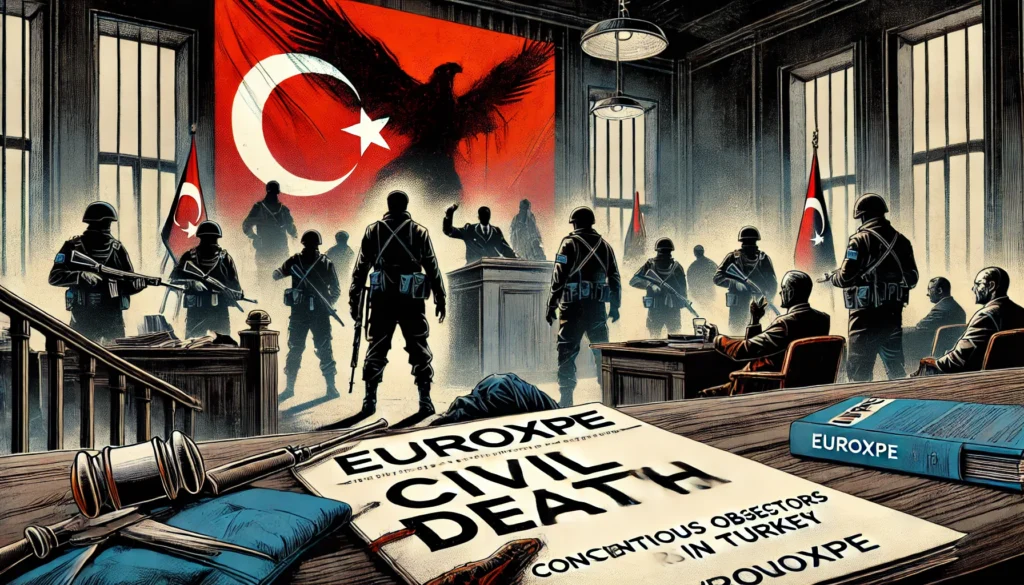The Council of Europe has issued a strong call to Turkey, urging the country to implement legal reforms that provide alternatives to compulsory military service. This follows the European Court of Human Rights (ECHR) rulings in favour of conscientious objectors, with Turkey given until March 2025 to respond.
The Council of Europe’s Committee of Ministers has reiterated the need for Turkey to comply with the ECHR’s decisions, stressing that the current paid military exemption does not constitute a true alternative to mandatory service. This move is seen as a critical step towards upholding human rights within the country.
In 2006, the ECHR ruled against Turkey for practices that essentially condemned conscientious objectors to a form of “civil death.” Despite this, Turkey has yet to enact meaningful reforms. During its meeting on 13 June, the Committee highlighted that four separate ECHR rulings remain unenforced, demonstrating Turkey’s ongoing non-compliance.
Countries with Compulsory Military Service
- Austria: All male citizens are required to serve about eight months of military service. Conscientious objectors can opt for 13 months of community service instead. A 2013 referendum saw 59.7% of Austrians vote to retain conscription.
- Southern Cyprus: Conscription is mandatory for all male citizens between the ages of 18 and 50. The duration of service is typically 14 months.
- Denmark: Men are required to perform 4 to 12 months of military service at age 18. Alternatively, they can choose community service.
- Estonia: All male citizens aged 18-27 must serve 8-11 months of military service. The duration varies based on education level and position within the military.
- Finland: Conscription is mandatory for men starting at age 18, with service durations ranging from 6 to 12 months, followed by a period as a reservist until age 50.
- Greece: Mandatory military service for men aged 19 to 45 varies in duration, with nine months for the army and 12 months for the navy. Civilian service is available for conscientious objectors.
- Latvia: Recently reintroduced conscription requires men aged 18-27 to serve 11 months, starting from January 2024. Women can apply voluntarily for the same service.
- Norway: Became the first European country to introduce compulsory military service for both men and women in 2015. The duration of service is 12 months.
- Sweden: Reintroduced conscription in 2017, requiring men and women aged 18 to serve for a period of 9 to 12 months.
- Switzerland: Military service is compulsory for men starting at age 18, lasting for about 21 weeks. Civilian service is an alternative for conscientious objectors.
- Turkey: All male citizens aged 20 and above are required to serve in the military for a period ranging from six to twelve months. Despite economic difficulties, Turkey recently increased the fee for paid military exemption, further complicating access to alternatives for many citizens.
Countries without Compulsory Military Service
- Belgium: Abolished conscription in 1992.
- France: Ended conscription in 1997 but has a “Defence and Citizenship Day” for youth education.
- Germany: Suspended conscription in 2011, though there are ongoing debates about its reintroduction.
- Italy: Suspended conscription in 2004 in favour of a professional military.
- Netherlands: Abolished conscription in 1996, though it can be reinstated if needed.
- Spain: Ended conscription in 2001.
- United Kingdom: Ended conscription in 1963.
The 2006 Landmark Decision
The 2006 decision marked the first instance where the ECHR ruled against Turkey for its treatment of conscientious objectors. These individuals face continuous prosecution, convictions, and are often forced into hiding. The Committee has criticised Turkey for failing to take concrete steps to address these human rights violations, emphasizing that under the European Convention on Human Rights (ECHR), Turkey is obligated to fully and promptly comply with court decisions.
Inadequate Reforms and Ongoing Violations
Despite reducing compulsory military service from twelve months to six months in 2019 and introducing a paid military exemption, the Committee noted these measures fall short of providing a genuine alternative to compulsory service. Conscientious objectors still face repeated prosecution and live under the threat of continuous punishment, which forces many into a clandestine existence.
Financial Disparities and Human Rights Concerns
The recent economic crisis in Turkey has further exacerbated these issues. The fee for paid military exemption has skyrocketed from 180,000 TL to 230,000 TL as of 1 July. This increase disproportionately affects citizens earning the minimum wage, effectively allowing only those from wealthy families to avoid compulsory service. This stark disparity highlights a significant human rights concern, as it creates an unequal burden on different segments of society.
Persistent Persecution
Conscientious objectors such as Osman Murat Ülke, Yunus Erçep, and Ersin Ölgün, continue to be treated as draft evaders and live under constant threat of prosecution. The Committee has expressed deep regret that these individuals face numerous restrictions akin to a “civil death.” Mehmet Tarhan’s ongoing trial since 2005 and Ersin Ölgün’s recent fine in December 2023 further illustrate Turkey’s persistent failure to respect the rights of conscientious objectors.
A Call for Genuine Alternatives
The Committee has given Turkey until March 2025 to respond to these concerns and to draw inspiration from other countries within the Council of Europe that have successfully implemented alternatives to compulsory military service for conscientious objectors. The call is clear: Turkey must introduce legal reforms that provide real, viable alternatives to compulsory military service, respecting the rights and freedoms of all its citizens.
Conclusion
The Council of Europe’s recent stance underscores the urgent need for Turkey to address its human rights obligations regarding conscientious objectors. The lack of genuine alternatives to compulsory military service, combined with the financial barriers posed by the paid exemption, highlights a troubling disregard for human rights. As Turkey faces international scrutiny, it remains to be seen whether the government will take the necessary steps to align its policies with European human rights standards.
Moreover, for all European countries enforcing compulsory military service, adopting a system where citizens can gain knowledge freely, akin to obtaining a driver’s licence, may be more suitable for modern life. This approach would underscore that advancing towards world peace does not require an increase in military technologies and troops.






